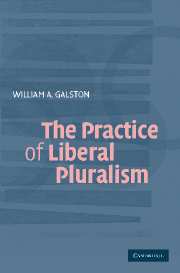Book contents
- Frontmatter
- Contents
- Acknowledgments
- 1 Introduction
- PART I PHILOSOPHICAL FOUNDATIONS OF LIBERAL PLURALISM
- 2 Value Pluralism and Its Critics
- 3 Political Pluralism and Limits on State Power
- 4 Expressive Liberty and Constitutional Democracy: The Case of Freedom of Conscience
- PART II LIBERAL PLURALISM AND PUBLIC ACTION
- PART III POLITICS, MARKETS, AND CIVIC LIFE IN LIBERAL PLURALIST SOCIETIES
- PART IV DEFENDING LIBERAL PLURALISM
- Index
3 - Political Pluralism and Limits on State Power
Published online by Cambridge University Press: 18 December 2009
- Frontmatter
- Contents
- Acknowledgments
- 1 Introduction
- PART I PHILOSOPHICAL FOUNDATIONS OF LIBERAL PLURALISM
- 2 Value Pluralism and Its Critics
- 3 Political Pluralism and Limits on State Power
- 4 Expressive Liberty and Constitutional Democracy: The Case of Freedom of Conscience
- PART II LIBERAL PLURALISM AND PUBLIC ACTION
- PART III POLITICS, MARKETS, AND CIVIC LIFE IN LIBERAL PLURALIST SOCIETIES
- PART IV DEFENDING LIBERAL PLURALISM
- Index
Summary
LIBERAL DEMOCRACY AND CIVIL ASSOCIATION
A liberal democracy is (among other things) an invitation to struggle over the control of civil associations. State/society debates have recurred over the past century of U.S. history, frequently generating landmark Supreme Court cases. While the specific issues vary, the general form is the same. On one side are general public principles that the state seeks to enforce; on the other are specific beliefs and practices that the association seeks to protect. Boy Scouts of America v. Dale is the latest chapter in what will no doubt be a continuing saga.
Within the U.S. constitutional context, these issues are often debated in terms such as free exercise of religion, freedom of association, or the individual liberty broadly protected under the Fourteenth Amendment to the U.S. Constitution. Rich and illuminating as it is, this constitutional discourse does not go deep enough. It is necessary to reconsider the understanding of politics that pervades much contemporary discussion, especially among political theorists, an understanding that tacitly views public institutions as plenipotentiary and civil society as a political construction possessing only those liberties that the polity chooses to grant and modify or revoke at will. This understanding of politics makes it all but impossible to give serious weight to the “liberal” dimension of liberal democracy.
The most useful point of departure for the reconsideration of politics I am urging is found in the writings of the British political pluralists and thinkers working in the Calvinist tradition. This pluralist movement began to take shape in the nineteenth century as a reaction to the growing tendency to see state institutions as plenipotentiary.
- Type
- Chapter
- Information
- The Practice of Liberal Pluralism , pp. 23 - 44Publisher: Cambridge University PressPrint publication year: 2004



